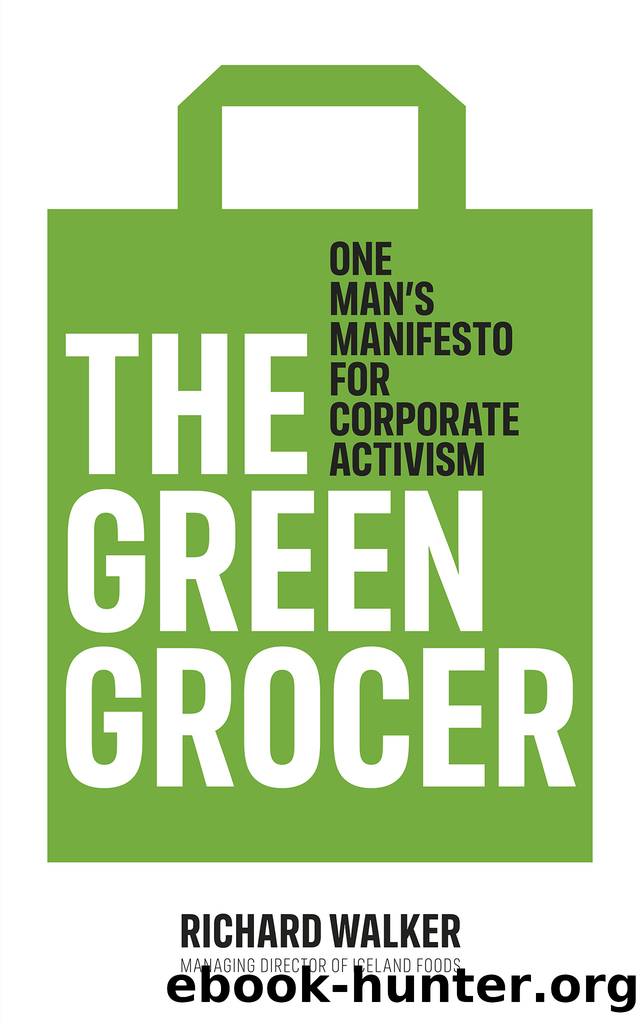The Green Grocer: One Man's Manifesto for Corporate Activism by Richard Walker

Author:Richard Walker [Walker, Richard]
Language: eng
Format: epub
Tags: Business & Economics, Green Business, Biography & Autobiography, business, nature, Environmental Conservation & Protection, Business Ethics, General, science, Global Warming & Climate Change, Development, Sustainable Development
ISBN: 9780241528839
Google: NSIhEAAAQBAJ
Publisher: DK Publishing
Published: 2021-04-01T00:26:40.937552+00:00
g CONTENTS
CHAPTER 4
HOW A CARTOON ORANGUTAN HELPED TO CHANGE THE WORLD
Eliminating palm oil
âA NATION THAT DESTROYS ITS SOILS DESTROYS ITSELF. FORESTS ARE THE LUNGS OF OUR LAND, PURIFYING THE AIR AND GIVING FRESH STRENGTH TO OUR PEOPLE.â
FRANKLIN D. ROOSEVELT1
Some issues just arenât as tangible or as obvious to consumers as plastic. A lack of public awareness, and therefore engagement, means that urgent problems are often hidden from view. Improvement is slow and tragedies go unchecked.
These types of issues lurk within supply chains, out of sight and mind. Sometimes they might be hiding in plain sight â such as those Leicester textile factories producing dirt cheap garments for online fast fashion companies, which in July 2020 were allegedly found to be paying their workers as little as £3 an hour, far below the minimum wage.2
At other times, such controversies occur silently, on the other side of the planet. In remote places, enforcing modern slavery laws or policing overfishing within Marine Protected Areas can be exceptionally difficult. As a western-based retailer, rather than send out armies of auditors on a wild goose chase across the globe, we must rely on high industry and regulatory standards, robust supplier agreements, work alongside trade service providers and, ultimately, hope that no one cuts corners that we canât look around.
Yet just because such problems cannot be seen does not mean they do not exist. And sometimes, it is easier simply to look the other way. As consumers, we may have read disturbing accounts of incidents of child labour and appalling working conditions in the cobalt mines of the Democratic Republic of Congo. But it doesnât stop our insatiable desire for the latest lithium-ion rechargeable phone or car â and the booming trade in what are now called âblood batteriesâ.3
Unearthing these issues, understanding where the politics of supply chains might lead and confronting our own complicity can be nothing short of epiphanic.
When I decided to investigate one such concealed issue, I started on a journey that took me high up our own value chain, to a world far removed from the orderly retail shops of the UKâs high streets. A place where not only was I confronted with the stark environmental reality of our ignorant sourcing decisions, but the social injustice they were causing too. And little did I know when I started thinking about palm oil that I would eventually be taken on a collision course with hostile media outlets around the world, and even some governments, protective of their nationâs interests.
The palm oil problem
Our campaign against tropical deforestation, primarily caused by the illegal growth of unsustainable palm oil production, was one of the highest profile corporate environmental initiatives of recent years. And despite being fiercely contested by the governments of Malaysia and Indonesia, and wilfully misinterpreted by some commentators in the UK and Asia, it was also one of the most effective â because it made people see the issue for the first time.
As a long-standing supporter of Greenpeace, I had naturally been aware of the growing environmental concerns about palm oil for some years.
Download
This site does not store any files on its server. We only index and link to content provided by other sites. Please contact the content providers to delete copyright contents if any and email us, we'll remove relevant links or contents immediately.
Harry Potter and the Goblet Of Fire by J.K. Rowling(3108)
Never by Ken Follett(2925)
Unfinished: A Memoir by Priyanka Chopra Jonas(2923)
Machine Learning at Scale with H2O by Gregory Keys | David Whiting(2337)
The Man Who Died Twice by Richard Osman(2319)
Fairy Tale by Stephen King(2107)
Will by Will Smith(2086)
Rationality by Steven Pinker(1784)
The Storyteller by Dave Grohl(1676)
The Dark Hours by Michael Connelly(1590)
The Dawn of Everything: A New History of Humanity by David Graeber & David Wengrow(1584)
The Stranger in the Lifeboat by Mitch Albom(1568)
Cloud Cuckoo Land by Anthony Doerr(1455)
New Morning Mercies: A Daily Gospel Devotional by Paul David Tripp(1410)
Friends, Lovers, and the Big Terrible Thing by Matthew Perry(1356)
The Becoming by Nora Roberts(1349)
Crying in H Mart by Michelle Zauner(1341)
Einstein: His Life and Universe by Walter Isaacson(1327)
A Short History of War by Jeremy Black(1313)
